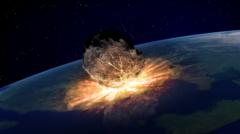A colossal meteorite impact has been linked to the flourishing of early life on Earth, according to new research. Discovered in 2014, this meteorite, estimated to be 40-60km in diameter and 200 times larger than the one that caused the extinction of dinosaurs, struck our planet around three billion years ago, leaving a vast 500km crater in its wake.
The meteorite, referred to as S2, triggered a tsunami far greater than any historical records and created immense heat, resulting in the boiling of Earth's oceans. Harvard University professor Nadja Drabon, the lead author of the study, emphasized the duality of such impacts, noting that despite the chaos they inflicted, they inadvertently provided conditions for early life to thrive.
Drabon and her team spent considerable time in the Eastern Barberton Greenstone Belt in South Africa, collecting rock samples and searching for spherule particles that provide critical insight into the impact's aftermath. Their findings revealed that the violent nature of the impact churned up essential nutrients like phosphorus and iron, thereby stimulating biological growth.
"After an extinction event, it's like brushing your teeth," Drabon analogized. "It kills 99.9% of bacteria, but they rebound quickly." This implies that life had not only survived in the wake of these cataclysmic events but actually thrived, benefiting from the vital nutrients ejected into the environment post-impact.
As a result of these investigations, the narrative around such massive meteorite impacts is shifting. Rather than simply a source of destruction, the events that shaped early Earth are being recognized as crucial moments that facilitated the conditions for life to flourish. The team’s results will be published soon in the journal PNAS, adding a new chapter to our understanding of life's emergence on a tumultuous planet.


















